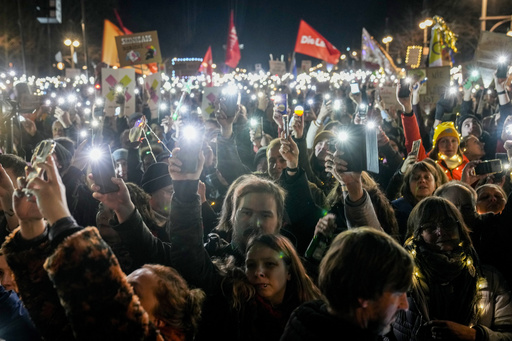
BERLIN — The Alternative for Germany (AfD) party seems poised for its most significant national election performance to date this month, with its first-ever candidate running for chancellor. While it is unlikely to form a governing coalition in the immediate future, its influence on the national dialogue, particularly concerning migration, has become undeniable.
The far-right AfD entered Germany’s national parliament eight years ago, citing widespread dissatisfaction with the influx of migrants during the mid-2010s as a primary concern, and maintaining its focus on immigration as a central theme. The party has, however, adeptly capitalized on public grievances concerning various issues, including the country’s transition away from fossil fuels, the restrictions imposed during the COVID-19 pandemic, and the support for Ukraine following Russia’s aggressive military actions.
Origins of the Party
Founded in 2013, AfD initially garnered attention for its opposition to the financial bailouts that accompanied the eurozone debt crisis, which then-Chancellor Angela Merkel claimed had “no alternative.” Early on, the party was sometimes referred to as a “party of professors,” referencing its founding members’ academic backgrounds, although it maintained an underlying hard-right, anti-establishment character.
Over time, AfD has adopted increasingly radical positions and undergone several leadership changes. Following Merkel’s controversial decision in 2015 to allow a significant number of migrants into Germany, the party gained substantial traction, winning 12.6% of the vote in the 2017 national elections and securing its initial parliamentary seats.
Current Standing
After a decline to 10.3% in the 2021 elections, AfD has rebounded amid the challenges faced by Chancellor Olaf Scholz’s center-left administration, which has experienced a series of internal conflicts culminating in its collapse. A year ago, protests erupted in response to reports of right-wing extremists discussing the mass deportation of immigrants, including German citizens, with some AfD members reportedly present. Despite this, the party has not suffered significant long-term damage to its polling and placed second in recent European Parliament elections. Additionally, in September, Björn Höcke, a prominent figure within its far-right faction, achieved the first far-right electoral victory in a state election in post-World War II Germany.
With renewed confidence, AfD is heading into the upcoming election with assertive rhetoric. Their chancellor candidate, Alice Weidel, has adopted the controversial term “remigration,” which calls for mass deportations of undocumented individuals. The party also urges the immediate elimination of sanctions against Russia and opposes military aid to Ukraine while advocating for the reinstatement of a national currency and a restructured European Union that resembles a less formal “association of European nations,” though it stops short of explicitly proposing a departure from the EU.
Domestic Oversight
The German domestic intelligence agency currently monitors the AfD due to allegations of right-wing extremism, and its branches in three eastern states are classified as “proven right-wing extremist” entities. The AfD contests these evaluations and rejects any ties to the Nazi era, notwithstanding Höcke’s appeal against convictions for invoking Nazi slogans during political events.
Support Base
With a broad support base, the AfD is represented in all but two of the 16 state legislatures, finding particular strength in the historically less affluent eastern regions of the country. Political science professor Wolfgang Schroeder notes that AfD has a remarkable ability to address issues with an intensity and radicalism that resonates with many voters, particularly young people, during a time of growing distrust in traditional political parties, which it often labels as a “cartel.” He characterizes the party as a forum for public frustration and resentment.
International Connections
AfD’s rise reflects a broader trend of far-right parties gaining traction across Europe, sharing commonalities with groups such as Austria’s Freedom Party and France’s National Rally. Weidel was recently in Budapest to engage with Hungary’s Prime Minister Viktor Orbán. However, the AfD is not a part of these parties’ coalition in the European Parliament due to past tensions. It was expelled from a previous group after controversial remarks made by its leading candidate regarding individuals associated with the Nazi regime.
Furthermore, the AfD has garnered support from notable figures, including billionaire Elon Musk, who has publicly staunchly endorsed the party. He controversially suggested that “only the AfD can save Germany,” even participating in a campaign rally with Weidel, who echoed a popular political slogan from the U.S., promising to “make Germany great again.”

